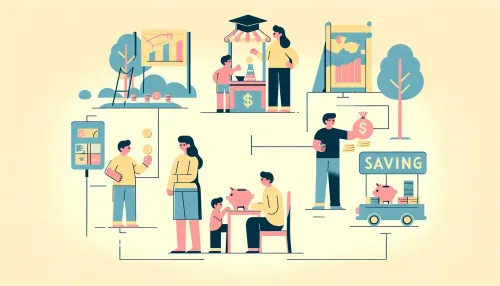The Revival of Bartering in Modern Personal Finance

The Benefits of Bartering in Modern Personal Finance
Amidst a rapidly evolving financial landscape, individuals are increasingly recognizing the nuanced advantages of bartering. This centuries-old method enables participants to leverage their skills and resources, fostering an environment where mutually beneficial transactions can flourish without relying on traditional currency.
Within the sphere of personal finances, embracing bartering presents an opportunity for individuals to trade their skills or excess goods for services they require, thereby creating a symbiotic relationship that can significantly augment one's financial position.
Leveraging Barter Networks for Mutual Benefit
The emergence of barter networks has catalyzed the resurgence of this economic practice, facilitating seamless exchanges and enabling individuals to expand their networks. These platforms provide a structured environment where individuals can connect with others possessing offerings that complement their needs, fostering a sustainable ecosystem for reciprocal value exchange.
By actively participating in these barter networks, individuals can empower themselves by effectively utilizing their resources while simultaneously meeting their requirements through alternate means. This not only promotes a reduction in direct expenses but also fosters a sense of community and trust within the network.
As technology continues to permeate every aspect of daily life, digital platforms have emerged as instrumental tools for conducting bartering transactions. These platforms offer a convenient medium for individuals to showcase their offerings, search for desired services or products, and ultimately negotiate terms for mutual benefit.
Related Article: The Power of Fiscal Stability: Mastering Cash Flow Management for Long-Term Solvency
Harnessing Digital Platforms for Bartering Transactions
Through the seamless integration of digital capabilities, individuals can effectively streamline their bartering transactions while transcending geographical limitations. This trend aligns with the ethos of modern personal finance, offering an array of opportunities for individuals to optimize their assets and diversify their economic activities.
Despite the evolution of financial systems, traditional bartering techniques have proven to be remarkably adaptable to contemporary digital practices. The intersection of timeless barter strategies with modern convenience has reinforced the relevance and applicability of this method within current financial frameworks.
Reviving Traditional Bartering Techniques in the Digital Age
This revival signifies a paradigm shift in personal finance, as it encourages individuals to reframe their approach towards consumption and resource utilization. By tapping into traditional bartering techniques in a digitized context, individuals can cultivate resourcefulness while contributing to a sustainable economic environment.
The resurgence of bartering extends beyond individual transactions, permeating into the broader economic sphere. Barter-based economies have emerged as a viable model for communities and businesses alike, fostering an alternative avenue for exchanging value without solely relying on conventional fiscal instruments.
By integrating ancient trade practices with modern principles, these economies demonstrate resilience against economic fluctuations while providing avenues for economic inclusivity and equitable resource distribution. Such adaptability reflects the enduring relevance and potential for growth within modern financial systems.
Related Article: The Financial Journey of Fortune Builders: Stories of Personal Finance and Investing Success
Barter-Based Economies: A Modern Approach to Value Exchange
Driven by contemporary ingenuity, barter exchanges have evolved beyond conventional norms, ushering in an era of efficient value swapping. These innovative exchanges offer tailored solutions that align with diverse needs, steering away from standardized transactions in favor of customized reciprocal arrangements.
This evolution underscores the malleability of barter systems within personal finance and investing realms. By embracing these advanced platforms, individuals can unlock new prospects for optimizing their assets and investments while forging meaningful connections within an expansive network.
Innovating Barter Exchanges for Efficient Value Swapping
Central to successful bartering transactions is the art of negotiation—the cornerstone upon which mutually beneficial arrangements are anchored. In navigating a burgeoning bartering economy, adept negotiation skills are imperative for securing favorable deals that resonate with individual objectives.
Effective negotiation in a barter economy demands astuteness, adaptability, and proficiency in assessing the true value of offered goods or services. Mastering this art empowers individuals to derive optimal returns from their engagements, thereby bolstering their financial dexterity and acumen.
Related Article: The Art of Money Mastery: Lessons in Growing Wealth and Navigating Financial Waters
The Art of Negotiation in a Bartering Economy
Embracing bartering within personal finance transcends conventional investment paradigms, unlocking pathways for unconventional yet lucrative opportunities. By engaging in non-traditional investments such as skill-based exchanges or specialized services swapping through barter arrangements, individuals can expand their portfolio with diverse assets that resonate with their expertise.
This adaptive approach provides fertile ground for cultivating unique investments that may not be readily apparent within traditional investment instruments. Consequently, it encourages individuals to broaden their investment horizons while leveraging their competencies within an alternative financial framework.
The resurgence of bartering in modern personal finance presents an enticing prospect for both newcomers and veterans within the field. As we witness the fusion of timeless practices with contemporary innovations, embracing this resurgent phenomenon holds transformative potential in reshaping individual financial strategies while fostering vibrant symbiotic relationships within interconnected networks.
Frequently Asked Questions
Participating in barter networks allows individuals to trade skills and resources without using cash, fostering mutually beneficial transactions. These networks create opportunities for reducing expenses, expanding social connections, and promoting a sense of community, all while enhancing personal financial positions through resourceful exchanges.
Digital platforms streamline bartering by providing a convenient space for users to showcase their offerings and search for desired services. They enable easy negotiation and connection between participants, overcoming geographical barriers and aligning with modern personal finance practices to optimize asset utilization.
Negotiation is crucial in a bartering economy as it determines the value exchanged between parties. Effective negotiation skills help individuals assess the worth of goods or services accurately, ensuring favorable deals that align with their financial goals and enhance their overall financial acumen.
Check Out These Related Articles

The Art of Raising Financially Savvy Kids: Parenting Hacks for Teaching Money Skills

The Color of Money: Confronting Racial Disparities in Personal Finance

Financial Freedom or Folly? Unraveling the Myth of Quick Riches in Freelancing and Investing

